A choice of quirky books
Bevis Hillier The humorist Paul Jennings wrote for Punch when it was still funny — that is, up to and including the editorship of the late Alan Coren. Jennings also wrote such books as Oddly Bodlikins (1953) and I Said Oddly, Diddle I? (1961). It was he who classified book reviewers as batchers, betchers (Betcher I could write it better than you'), bitchers, botchers and butchers. In this and my next review, I am cast as a promiscuous batcher. This first batch is of 'quirky' books; the next will be of 'funny' books. I reserve the right to be a betcher, a bitcher and a butcher too — I hope not a botcher.
The quirky books are small and in some cases suitable as Christmas gifts — quirky with the turkey. It is not their primary purpose to make you laugh, but several of them may do. I laughed more at than with Le Dossier: How to Survive the English (John Murray, £12.99), which purports to be by a French lady, Hortense de Monplaisir, and translated by Sarah Long. It is actually entirely the work of Long, but she knows both her France and her England pretty well — the blurb tells us she lived in Paris for ten years. The book is largely anti-English, and not affectionately so. I believe the English are the one nation in the world that positively enjoys being sent up. If an Englishwoman were to write a book called How to Survive the French, I doubt that many Frogs would be (to adapt a Coren phrase) writhing on the Aubusson, gurgling with rires.
One of Madame de Monplaisir's gripes about us is that we take hardly anything seriously. She also bellyaches about our large bottoms, our ugly women, our terrible dress sense, our taste for lavatory humour, our hopelessness at love (Sex is treated as an extension of the toilet function'), our horrible bread, our dodgy finances (Having an overdraft in France is a criminal offence') and our loony adulation of Tim Henman and other failures. (She thinks Scott of the Antarctic is top of our list of heroes — I guess more of us would choose Nelson, vanquisher of the French). She ridicules our obsession with the second world war (not quite France's Finest Hour?) and our crazy celebration of Christmas from September onwards, with about ten days needed to recover.
She smugly indicates that French Christmases are more frugal than ours. Don't I know it! When I lived in Paris, I was not enchanted when my true love gave to me three French hens. (A Cartier watch might have hit the spot.) Between them, the hens laid three eggs. I thought of stationing them at Biggin Hill to await the command 'Scramble!' Instead, in the interests of Euro–American amity, I sent them as a Christmas present to George W. Bush — All the President's Albumen.
Monplaisir finds loathsome the Christmas pantomime, with its perverted cross-dressing and filthy doubles entendres, though she has the grace to admit that Baudelaire was 'greatly struck by this manner of understanding comedy' — he experienced at the panto the `vertige de l'hyperbole'. Indignantly, she demands: 'Is there really anything funny about a big man dressing up as a grotesque "dame" and making jokes about flatulence?' To anyone English, the very question is comic. (Oh no it isn't! Oh yes it is!) Monplaisir's idea of a treat is to attend one of the mah-vellous parties of the French ambassador, on Bastille Day, with 'novelties like meringues cooked in liquid nitrogen'. Hold me back! And, by the way, what does Bastille Day mark? It marks the beginning of one of the most Niagaran bloodlettings in history. Fratemite, forsooth! Tell that to the citoyens whose heads ended up in the basket. Egalite! I remember how surprised I was to find firstand second-class carriages on the Paris Metro — you don't get those on the Northern Line. Liberte! Monplaisir hates our 'undisciplined, unruly' gardens, 'tumbling about in messy profusion'.
In France, we know what makes a good garden. Gravel, single specimen shrubs, and bright neat pots of geraniums. A clipped hedge and a plain green trellis, stark against a white wall.
Clearly the woman's education (she bangs on endlessly about how superior the French sort is to ours) has not encompassed her co-religionist Gerard Manley Hopkins — let them be left, wildness and wet: Long live the weeds and the wilderness yet.
One of her most severe criticisms of the English is that we never say what we really mean. An example she gives of Albion at its most perfidious is this: a friend excitedly shows photographs of a house she has bought in France. The English people say: 'How wonderful! Lucky you!' (until she has left the room, that is). The French person says: 'Why did you buy a house there? It's too far, you'll never make proper use of it.' I think the English are being polite and kind. What is the point of slagging off a fait accompli (to filch a phrase from that wonderful French language)? You'll only make your friend miserable; and she'll not get back her deposit from a mercenary French estate agent.
In any case, Monplaisir is wrong in supposing that all English people dissemble in this way. It is true only of people in the decadent South of England. A Surrey lad like me will say 'Are you sure you can't stay?' when he means 'Push off!' But oop north they do speak their minds. When I was living in Los Angeles I was visited by an artist friend from New York. I said: 'Bring a portfolio of your drawings and I'll arrange for us to visit David Hockney.' We did so. Bradford-born Hockney was most hospitable, but on being shown my friend's work, he said: 'Well, you've never mastered the art of perspective, 'ave you?' As we drove away — my friend totally crushed — I wondered how I would have framed the same message.
Something like this: You obviously enjoyed yourself a lot, doing this. It's very good of its kind; but, if I had a small reservation, it might be: in places the perspective is a little wonky. I'm sure you can remedy that with practice, and it will make all the difference.
Monplaisir condemns herself out of her own bouche when she attacks the 'favourite English pastime' of queuing. She writes: 'It could not happen in France. We would just arrive at opening time and push our way to the front.' This attitude is comparable to that of an American businessman I knew. Observing a queue of Brits at a bus-stop, he sneered: 'What sheep!' But to me the queue is an emblem, if not the essence, of civilisation. It is subordinating one's own interests to the common weal. By barging to the front of the queue, Monplaisir is acting rather like somebody who murders a colleague to gain promotion over them: it benefits the murderer but doesn't make things rosy for the victim. Monplaisir's selfish philosophy of life is enshrined in her name — my pleasure; that of most Brits is better expressed in that of Mrs Doasyouwouldbedoneby in Charles Kingsley's The Water Babies. Again, gobbling garlic may make frogs' legs palatable, but I'd rather not find myself next to the gobbler in a cinema.
All that said, I have to admit that there are several parts of Monplaisir's book that made me cry: 'Touché!' She rightly reprobates our lamentable attitude towards intellectuals and culture. To be a member of the Academie Francaise is a supreme honour (you get a sword); but what is the British Academy? Mainly a closed-shop nest of university historians — and you don't even get a fishknife. (Why isn't Sir Michael Holroyd an FBA?) She's right about our railway system in comparison with the SNCF. Our binge-drinkers are another fair target. 'Walk down a London street on a Friday night, and you could be in a Hogarth etching of Gin Alley.' (Gin Lane, actually, dear; and it's an engraving.) The book ends with Ten Reasons to Hate the English, including (get this!) 'their sinister failure to move their arms when speaking'. Her Ten Reasons to Love the English are much more half-hearted. And, after all her insults, Monplaisir/Long tries to wheedle her way back into our good books with an ingenuously ingratiating and obviously insincere afterword headed `Vive la difference!' The English, she concludes, are 'not the odd barbarians you once thought, but a well-meaning people, whose eccentricities offer a valuable counterbalance to our own fine intelligence'. One thing about us she has not realised: we early learn not to get riled by being teased. United we stand: we are not to be divided by Long-derision.
I welcome It's Not Rocket Science — and Other Irritating Modem Clichés (Portrait, £9.99) by Clive Whichelow and Hugh Murray, two men who write for television comedy shows. I'm gleeful to see such expressions pilloried as '24/7' ('She's on my case 24/7'); 'absolutely' (instead of 'yes'); 'cheers' (instead of 'thank you' or 'goodbye'); 'drop-dead gorgeous' (why not 'drop-dead ugly'?); `go ballistic'; 'carbon footprint'; `gobsmacked'; 'gutted' (usually pronounced `gu'ed') and 'What part of "no" don't you understand?'
The authors miss a few ghastlyisms, among them, 'I hear what you say' (meaning and I think it's rubbish'); 'unacceptable' (a cliché introduced by Ted Heath's originally trenchant 'unacceptable face of capitalism', referring to 'Tiny' Rowland's Lonrho); `devasta'ed' (similar to `gu'ed'); 'unsustainable'; and 'emote' (originally an Americanism — 'Kimberley was emoting in a corner'). They include that pesky journalistic device 'I made that last bit up' but omit 'What have X, Y and Z in common?', as in 'What have Karl Marx, Mrs Mary Whitehouse and Julian Clary in common?' and 'Step forward... ', as in 'Who's the rudest TV inquisitor? Step forward, Jeremy Paxman.' Among the sports clichés, they give us 'We were robbed'. Sorry, it has to be 'We was robbed', a dereliction of grammar comparable to 'Ronnie played brilliant' in snooker — a game whose commentators have also given us 'I woonder what's going through that yooung mun's head now.' In football, rugby and athletics: 'Now the crowd's really caught alight.' If only they would.
I am old enough to remember the 1940s equivalents of some of the modern clichés. For examples, the modern 'Tell me about it!' (derived mainly from Australian soaps) was 'You're telling me!'; and 'In your dreams' (also an Aussie soapsud) was 'Some hopes!' or 'Like hell!' I am also old enough to know that some of the clichés the compilers regard as modern are old chestnuts. They include 'brigade'.
Although this was originally a military term meaning a body of troops, it can now be tacked on to other phrases to denote a group of people who are often as far from being trained fighters as it is possible to be, for example 'the politically correct brigade'.
Yes, but `the hatless brigade' was current at least as early as the 1930s, when no gentleman went out baht 'at and Lock's of St James's Street did a roaring trade in bowlers.
The authors acknowledge that 'basically' is far from new — they could have cited John Betjeman's satire of it in his 1971 poem 'Executive' — Essentially I integrate the current export drive And basically I'm viable from ten o'clock till five I have to say, for once in opposition to my hero Betjeman, that I find 'basically' useful and inoffensive. It means 'at base'; and if one is seeking an English alternative to the French au fond, it is perhaps preferable to 'at bottom', which might appear in a Carry On film The authors marshal a good set of political clichés, but miss one of the most frequent and maddening, 'It's not a question of...' — again an Anglicism for the evasive Froggism 'line s'agit de. . .' (Why are thousands of our post offices being closed down?' It's not a question of closing down post offices; it's a question of rationalising the whole postal systern of this country to get better value for money.') The horrid political cliché 'in real terms' is also an absentee.
Among journalistic clichés, they miss 'massive heart attack' and 'massive manhunt'. Have you ever read a report of a limited manhunt? Remember, too, B.I. Isherville's couplet on newspaper prose — Where every heresy is rank, and every rank is serried; Where every crook is hatchet-faced, and every hatchet buried.
They note that 'diva', which once meant a demanding female opera singer, now just means a demanding woman. Damn! That ruins a scene in my projected novel The Palindrome Murders, in which the following palindrome is found on the corpse of a Chinese opera singer; AVID RATS GNAW ANNA WANG, STAR DIVA. There's an amusing section in Whichelow's and Murray's book, on cliché gestures. One of these is 'hand on crotch'.
The rappers' delight. Stride around in front of people in an assertive manner while clutching as much of your manly parts as you can fit into one big bejewelled fist...
In the mid-1980s, Michael Jackson was doing that so much that Variety wondered whether that part of his body worked his arms and legs.
An Alphabet of Aunts by C. M. Dawnay and Mungo McCosh (Cape, £14.99) is a lovely book, mainly pictorial. In America, 'aunt' is pronounced exactly the same way as 'ant' — just as a 'rider' is a writer, Adam burn' is not a snapshot in the Garden of Eden, but an atom bomb, and 'pear shoot' is not a variation on William Tell and the apple, but a parachute. An Alphabet of Aunts has this transatlantic accent as its launch-pad, so it should sell out in Peoria. Once I had got over Brit irritation about this conceit, I revelled in the inventiveness and the brilliant surreal design of this book. It illustrates, for example, ambul-ant, croissant, jubil-ant and Protest-ant. Also Kant. The coloured drawings by McCosh are a delight. Ambulant walks her dogs past G.E Watts's statue of Physical Energy in Kensington Gardens. Elegant is on the catwalk. Osculant has smoochy lips, behind a gauzy black veil.
A bit of cheating goes on at the end of this alphabet: Y is just a question-mark (I thought of Winant, an American ambassador to the Court of St James in the war, but that won't quite do); and Z is, lamely, ZZZZZZZZZ — long snooze — that is to say, all alpha-bets are off. (They might just have got away with Zante — that is, Z-auntie — the southernmost of the Ionian Islands.) But this is a gem of a book, I see it becoming a collectors' piece — like old copies of The Saturday Book — in antiquarian book dealers' catalogues of 2050. So, if you're between 20 and 30, it might be worth buying several copies and 'laying them down' like vintage wines.
The author of the book, Caroline Dawnay, is a top literary agent. In September, when The Times published a chart of literary agents, linking them to authors and each other, Dawnay figured as the agent of Nick Hornby. She has subsequently been much in the news because of volcanic upheavals in the world of agents. The blurb of the Auras book assures us that Mungo McCosh's name is not invented and that he lives in Scotland — which is why, no doubt, the 'Gallivant' illustration shows kilted dancers, possibly performing an eightsome reel.
London above Eye Level (Frances Lincoln, £9.99) is another charming, mainly pictorial book. As it measures only six inches by four inches by half an inch, it is the ideal stocking-filler. Its author is John R. Murray, who until 2002 was the last of that family to run the publishing firm of John Murray, founded in 1768, which published Byron, Jane Austen, Darwin and Betjeman from exquisite 1812 offices in Albemarle Street, London. It was Betjeman who urged the young John Murray VII (and all the rest of us, on television) to look at the upper storeys of buildings — above eye level, above the ground floor, so often ruined by modern shops and other excrescences.
For this book, Murray has done just that. The photographs show a fascinating succession of architectural details — indeed, the book might have been given the conservationist title Spare Us the Details. You could conscript the book for a Christmas-party quiz, for Murray has put all the picture captions at the end, giving us the chance to identify the sights and sites from the photographs alone. He did not need to stir from Albemarle Street to illustrate the Belle Epoque entrance to Royal Arcade, with its icingsugar decoration in pink and white by Archer & Green (1879-80). I wonder how many readers will recognise the trumpeting stone elephant on page 81. Everyone, of course, will find some of his own favourite details omitted. I would have put in the giant snail on the facade of EEscargot restaurant in Soho. Was it, perhaps, made in Paris and brought to London — a Snail of Two Cities? (And yes, I am familiar with the apocryphal Spoonerism about the auction of a bust of the naked Pauline Borghese — A Sale of Two Titties.) The Book of Regrets, compiled by Juliet Solomon (JR Books, £10.99), was a bright idea on her part: ask well-known people what they most regret. The less interesting celebs (John Major, Esther Rantzen) admit, Piaf-like, to no regrets. The more interesting figures have plenty. Michael Holroyd regrets he turned down a newspaper invitation to cover the heavyweight boxing championship of the world. The most engaging answer is by Laurence Llewelyn-Bowen: 'Any regrets? Have you not seen my wardrobe from the mid-1990s?' I regret I wasn't asked to contribute.
The last two books in this batch could both be held over for the 'funny books' tranche; but like much of the best humour, they make serious points. The first of them is Always Go to Bed on an Argument by Deborah Ross (Profile, £9.99). Full of sophisticated wit, the book is aimed at messy housewives — or, as Ross calls them, 'Non-Domestic Goddesses'. I'm not a messy housewife, but I am a messy bachelor, so much of what she writes applies to me. I'm very good on time — always punctual — but very bad on space. Basically (if I may use that outlawed word) the book says: don't be a fusspot and perfectionist about the house. Ross applauds the Non-Domestic Goddess (N-DG) who makes a nice cup of Nescafe by running the mug under the hot tap; who has very old ice-lollies embedded in the iced-up walls of her freezer; who prepares bedding between guests by turning the pillow over to the 'fresh' side; has hair that looks as if it has been done with an electric toothbrush; and has no use for greaseproof paper or kitchen foil. The N-DG has 'exacting low standards'. For my taste there is a bit too much anti-man stuff — something that irks me in the otherwise hilarious novels of Kathy Lette — but that's because I am not an N-DG.
'Sony, madam, I'm not trained to tell the time.'
The book is a pattern for the slattern; and you don't need to be in your first youth, either. Ross writes: When Jane Fonda appears on TV, advertising some face cream and saying, 'Not bad for 68, huh?' the true Non-Domestic Goddess will always want to shout back, 'Come on, love. Get a grip. You looked a hell of a lot better as Barbarella.' The Non-Domestic Goddess figures someone has to say so, and what's wrong with growing old anyway?
Hear, hear.
The other quirky book that could easily get a transfer to the funny books team, is The Perils of the Pushy Parents, a long poem written and illustrated by Boris Johnson. (HarperPress, £10.00). Humour runs in Johnson's bloodstream, just as it did in Alan Coren's. (One difference: Coren never tried to become Mayor of London.) This excursion into verse is in the manner of Hilaire Belloc's Cautionary Tales, with nods in the direction of Harry Graham's Ruthless Rhymes for Heartless Homes and some aspects reminiscent of Clive James's ballads. The trick is performed effectively and entertainingly, though the poem does not have quite the zing of his almost Wodehousean columns in The Daily Telegraph.
It's about two children who spend a lot of time watching television. Their parents, ambitious for them, want to wrest them from the small screen and gorge them on books. Here are two sections on the pushy dad: Every year it grew intenser: At five he put them down for Mensa. At six he made them, lass and lad, Contest a maths Olympiad...
And with a gargle in his throat He'd make a grab for the remote. He'd zap the programme off and holler 'Go and read some Emile Zola!'
As you've probably guessed, this cultural force-feeding leads to disaster. The kids lock their violin tutor in the loo. At last he is released by the parents.
His alabaster hands were sore From scratching at the toilet door.
Streaks of tears ran down his face; His silk cravat was out of place.
He hadn't quite yet lost his mind.
Before he fainted he resigned, And gave a kind of punctured sigh.
They looked each other in the eye Then from downstairs they heard the roar: The telly! Louder than before!
In smashing the screen with a giant hammer, Dad manages to wound both himself and Mum. In the next scene, the children push them along a cliff in a wheelchair — 'The pushy have become the pushed'. Of course the thing careers over the cliff, but the parents are grabbed in the nick of time by their kids. Father attributes the rescue to the standards they have learnt from books. Not at all: the boy exclaims, 'It's not the fruit of your tuition. We got it from the TELEvisioN!'
(In countless serials, he and his sister have seen `the hero grab/ Some bike or plane or taxicab') Father deduces the obvious moral: Every child's a human being, Not a piece of Plasticine. Loving parents, learn from me. If your children crave TV Tell them, OK, what the hell You can watch it for a spell...
IF YOU READ A BOOK AS WELL.
Accepting the Foyle's Poetry Prize in 1955, John Betjeman said, 'Poets are prophets.' He wasn't only thinking of William Blake. Just a few days after reading Boris Johnson's poem, I opened my Times to find the headline, 'Boarding helps children escape pushy families, claims top head'. Vicky Tuck, headmistress of Cheltenham Ladies' College, had suggested that children were sometimes better off at boarding school, to escape parental pressure at home. She told the Times: There is a phrase 'helicopter parenting', which refers to parents who hover over their children, making sure they can play a musical instrument ... can do this and do that. That can create anxiety in children and is shortening childhood.
After reading that, I decided to attempt a pendant to Boris Johnson's effort The pupils ruled by Mrs Tuck Can hardly comprehend their luck.
No helicopter parents hover Above their work to give them bower.
Dear little Rosie says: 'My Poppa Is like an ever-circling chopper; His constant vigil's quite absurd — And Mummy is a whirlybird.
I'm not considered an emoter, But shudder when I hear a rotor.
Thank God I'm not force-fed with knowledge: Cocooned here by the Ladies' College, I take things at an easy pace, And Dad and Mum aren't in my face.
How Boris understood my plight I'll never know; but he is right.
Parental pressure's not for me — This place is just my cup of tea.'

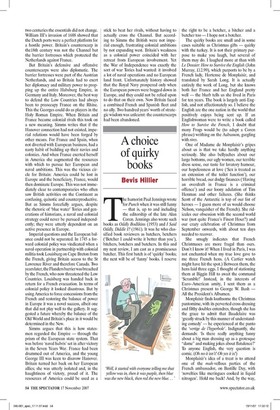
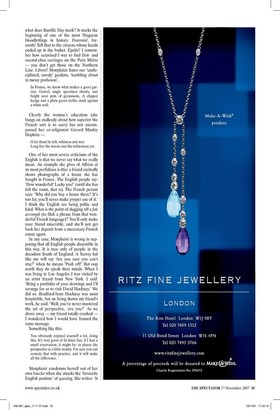
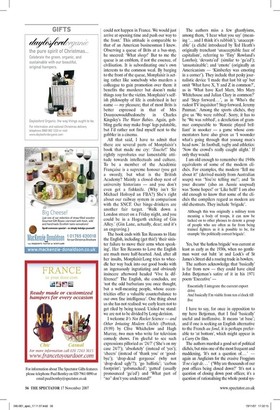
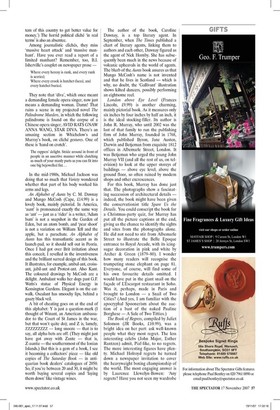
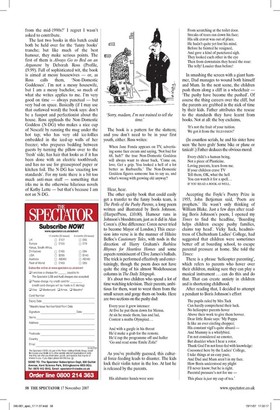


































































 Previous page
Previous page